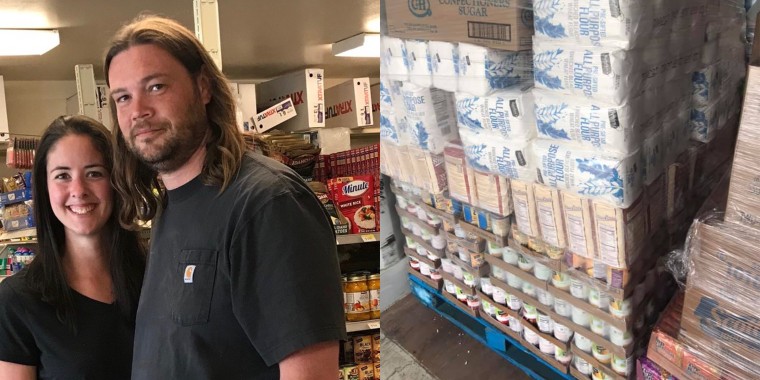Toshua Parker has owned ToshCo Icy Strait Wholesale, the only grocery store in his town of Gustavus, Alaska, for almost 10 years. The tiny town has a population of less than 450 people and is only accessible by boat or plane.
Usually, supplies for the store are brought in on a state-run ferry, which Parker says the town is "100% dependent on." However, amid recent budget cuts and the coronavirus pandemic, the ferry stopped operating, essentially cutting the town off from crucial supply lines.
To keep his store stocked and his community fed, Parker and his staff took matters into their own hands. Since mid-March, they have been making weekly treks to Juneau to pick up much-needed supplies, mainly from Costco. The trip, which includes a boat ride, takes a full day to complete.
"It's kind of a combination of state issues with the ferry system, and coronavirus on top of it," Parker, who also oversees ToshCo's daily operations, told TODAY. "That kind of made it to where we've been having to do these runs, and basically just run to (Juneau) and get all the groceries for (Gustavus)."
Last year, Parker and his wife, Cassia, who also helps run the store, purchased a large boat that could be used to sail to other ports in case the ferry ever failed. Now, their vessel has become a crucial lifeline for their town's residents.
Download the TODAY app for the latest coverage on the coronavirus outbreak.
Parker said that he and his team of about 15 people decided to start making the lengthy grocery run as the number of confirmed cases of COVID-19 continued to rise earlier this spring. Since the boat can only leave Gustavus at high tide, which only happens every 12 hours, each trip takes carefully timed planning both ways.
The first leg of the trip to Juneau takes around seven hours. Once Parker and his team reach Juneau, they stock the boat with 30,000 tons of supplies and groceries. After everything is safely stowed on board, it's another seven hours back to Gustavus where, once again, they have to wait for high tide to safely dock the boat.
"We have to get here at just the right time to come up the river again," he said. "We can't quite make it to Juneau and come back in time for the next tide, so we usually end up having to stay the night either tied to the dock in Juneau or sometimes anchored out here in front of Gustavus waiting for high tide again."
Another major concern for the crew is potentially contracting, and then spreading, the coronavirus. Juneau has 30 documented cases of the deadly virus, according to the city's health department. Currently, Gustavus has no known cases, and Parker said he and his team don't want to be the reason it spreads.
"Our crew is super careful. We've gone to a lot of measures to make sure it doesn't happen," Parker said. "For example, when we get to Juneau, myself and the crew stay on the boat, and we have guys in Juneau that we've hired that around and pick everything up get it ready, and then bring it out to the boat and they drop that stuff off and they leave, and our guys load the boat. We kind of keep some separation."
Further complicating the efforts, the Costco in Juneau — like grocery stores in many other parts of the country — doesn't always have everything Parker would like to pick up.
"There's been tons of supply chain issues," Parker said. "We won't know, a lot of times, what's not there until it's not there. We'll go to get all of our stuff, and then find out there's no milk or no eggs or something like that, which is a serious problem. So then we try to quickly source stuff from down in Washington and have it (shipped) up if there's a supply chain issue."
Despite the many mouths Parker is feeding, as evidenced by his massive orders placed at Costco, ToshCo is still considered to be one member, so when restrictions are placed on products, that limits what his team is able to bring back on any given run.
At one point, Parker said, Costco restricted egg purchases to just one dozen per member — which meant that for the entire town, he was able to buy just 12 eggs. He and his team scrambled to get more supplies brought up from Washington State that week. However, the next week, his order was over-filled: Costco delivered 1,000 dozen-egg packages.
"This is such a fast-moving thing going on that you can't just sit back and say, 'OK, there's no way, we just have to hope that maybe it'll be fixed by next week,'" Parker said. "Because what if it's not? Everything takes time to get here, so we have to immediately get stuff ordered and get it coming in."
The supplies that he brings back and forth include standard groceries like produce, meat and dairy, but Parker also brings things like hardware, potting soil and ammunition for hunters.
Despite the enormous amount of effort his operation takes, Parker said that he and his team of 15 don't see the work they're doing as anything extraordinary.
"You know, when you live in Alaska, you're used to the fact that you just have to kind of roll with the punches, find a way to get things done," he said. "Nothing is easy here, so when all this stuff came up it was just more of the same."
He added, "We're kind of used to the challenges and this was just a different challenge that we had to take on."


